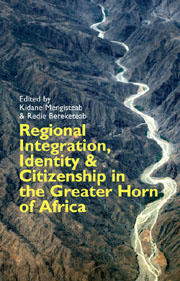Book contents
- Frontmatter
- Contents
- List of Tables, Figures & Appendices
- Notes on Contributors
- Acknowledgements
- List of Acronyms
- Part One RELEVANCE OF INTEGRATION TO IDENTITY AND CITIZENSHIP
- Part Two CRITICAL FACTORS IN INTEGRATION
- 4 Invisible Integration in the Greater Horn Region
- 5 Nationalist, Sub-nationalist, and Region-wide Narratives and the Quest for Integration-promoting Narratives in the Greater Horn Region
- 6 Infusion of Citizenship, Diversity and Tolerance in the Education Curriculum: Promoting Regional Integration and Peace in the Greater Horn Region
- 7 Radio and the Propagation of Anti- and Pro-Ethiopian Narratives in Somalia
- Part Three LESSONS FROM SELECTED AFRICAN INTEGRATION SCHEMES
- Index
- EASTERN AFRICAN STUDIES
5 - Nationalist, Sub-nationalist, and Region-wide Narratives and the Quest for Integration-promoting Narratives in the Greater Horn Region
from Part Two - CRITICAL FACTORS IN INTEGRATION
Published online by Cambridge University Press: 05 February 2013
- Frontmatter
- Contents
- List of Tables, Figures & Appendices
- Notes on Contributors
- Acknowledgements
- List of Acronyms
- Part One RELEVANCE OF INTEGRATION TO IDENTITY AND CITIZENSHIP
- Part Two CRITICAL FACTORS IN INTEGRATION
- 4 Invisible Integration in the Greater Horn Region
- 5 Nationalist, Sub-nationalist, and Region-wide Narratives and the Quest for Integration-promoting Narratives in the Greater Horn Region
- 6 Infusion of Citizenship, Diversity and Tolerance in the Education Curriculum: Promoting Regional Integration and Peace in the Greater Horn Region
- 7 Radio and the Propagation of Anti- and Pro-Ethiopian Narratives in Somalia
- Part Three LESSONS FROM SELECTED AFRICAN INTEGRATION SCHEMES
- Index
- EASTERN AFRICAN STUDIES
Summary
INTRODUCTION
Almost all countries, including the powerful ones, have now come to accept the tremendous power of the ongoing globalization and its impact on the re-alignment of political and economic forces on the globe. Its impact on countries has been differential: while some countries, especially the more economically advanced, may have benefitted from it, others, especially the less developed economies, have not. Therefore, many countries have vigorously pursued membership in regional economic organizations in order to survive and grow in an increasingly competitive world. Although regional integration blocs, such as the East African Economic Community and the European Common Market were born before the onset of the current globalization period – a time roughly taken to mean after the Cold War – it is only in the last twenty years that the world has seen a rapid growth in their numbers. A few of these have survived and flourished, while others have not fared well.
But what makes some integration experiments more successful? It appears that some experiments, such as those of the European Union (EU), became huge successes because of the similar characteristics of their constituent units. These include: the closer inter-identity relations of their constituent states, their higher cultural compatibility, their democratic nature and equitable citizenship rights, the complementarities of their economies, their abundant manpower resources, and the absence of foreign military intervention in their internal affairs. With reference to the concept paper Mengisteab (2009) developed for the Greater Horizon Horn Forum (GHHF) on regional economic integration in the Horn of Africa, this chapter focuses on inter-identity relations, which, along with the nature of the state, occupies a central position in promoting or hindering regional integration.
- Type
- Chapter
- Information
- Publisher: Boydell & BrewerPrint publication year: 2012



